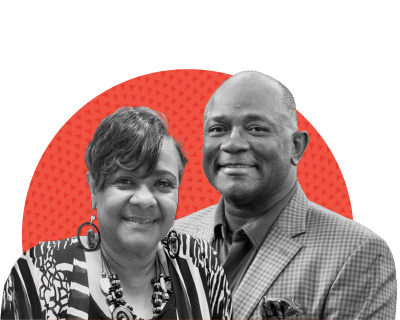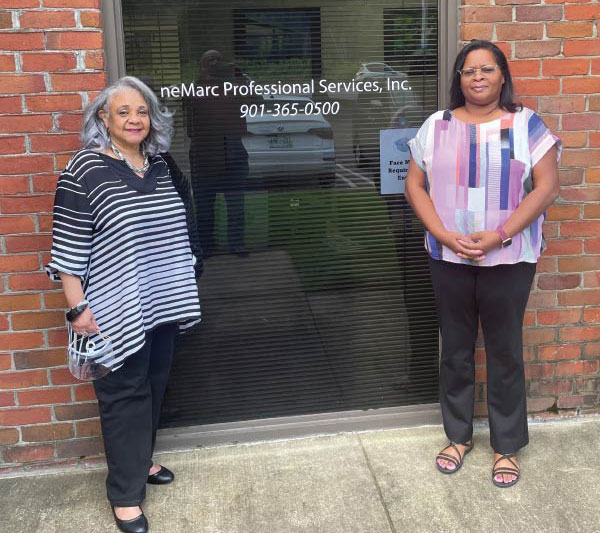neMarc Professional Services, Inc.
Location: Memphis, Tennessee
Industry: Administrative and Support Services
Website: nemarcstaffing.com
Leadership: BIPOC-owned, Woman-owned
ICIC Program: ICCC Memphis 2017, 2018, and 2020; IC100 Award 2019, 2020, 2021, 2022, 2023

Network
Carmen Brown and Ken Harris are transforming temp work into careers in government, education and business to uplift communities
Carmen Brown and Ken Harris are like most smart entrepreneurs: they saw an opportunity and they took it. But it wasn’t only an opportunity to build a successful, money-making business, it was also an opportunity to help build their community.
“What Carmen and I have created together is building a network,” Harris says. “We have a very good referral network. We’ve established very good communications with our partners. Because of our success … people come to us.”
Founded in 2003 by Brown, a former human resources manager at IBM, neMarc’s motto is “exceptional service is priority one.” Seems simple enough, but in the world of professional staffing, that ethos posed a challenge to Brown and Harris.
They needed to find top quality administrative and clerical employees who would sign on for long-term commitments with government agencies in desperate need of good workers. Harris, the company’s chief operations officer and chief financial officer, was coming off a 40-year career as a financial manager for non-profits and corporations. He had a strong background in information technology and HR and had just retired when a friend introduced him to Brown in 2006, just as Brown was launching the company’s growth strategy.
“I was tired of the corporate arena. I’d always been having to answer to someone else. I wanted to get into a situation where I’m making the decisions,” Harris recalls. “At the end of the day, if something doesn’t go right, I only have to get mad at myself. It was just time to be able to do something else … and reduce
the stress.”
“I really believe it’s my employees,” she says of her company’s success. “They are very skilled. And we have a training program online. They can improve their skills. It’s been amazing. The majority of the people want to work and they love what they’re doing.”
CARMEN BROWN, PRESIDENT & CEO, neMARC PROFESSIONAL SERVICES, INC.
Goal-oriented
He and Brown had similar goals, which included running a successful company where they could make a good living and help build their community. Raised in Memphis, Brown is the daughter of two school teachers and is a graduate of Knoxville College.
She worked for 22 years at IBM, moving around the country as needed. When she was told she would need to relocate from Rochester, New York to Tennessee, she took a job at Rochester Telephone, and joined the HR department. She later went to work for RandStad and learned about the importance of quality administrative and clerical staffing. She also learned why some employees worked out well with companies while others did not last.
“I saw some things going on with employees,” she recalls. “Certain employees weren’t getting the types of jobs I thought they should be getting.”
RandStad also offered her an opportunity to relocate, but instead, she decided to go back to Memphis and start her own business. She worked from home and met job seekers at Starbucks to help connect them with positions in government, nonprofits, and local businesses. In 2003, she got her first office in Memphis.
“I had a few clients that liked me and wanted to give me an opportunity,” she remembers. “I started doing proposals and joined the Memphis Minority Business Council. I was likable.”
She was also trustworthy. The Memphis city government and tangential agencies soon learned that Brown consistently supplied qualified employees who would commit to the job. She was diligent in weeding out bad workers and made sure that her referrals were top notch.

After Harris joined, the company continued to grow. She found ICIC through the Memphis Minority Business Council and attended classes and seminars at the University of Memphis. She participated for two years in the Inner City Capital Connections program offered by ICIC, where she established invaluable business contacts and created a robust network that has continued to this day.
“Our biggest challenge right now is not growing too fast. Ninety-five percent of the jobs that we have are over $15 an hour. Most are in the $20-$30 an hour range. Our problem tends to be finding people for some of the positions who are serious about working.”
KEN HARRIS, COO & CFO, neMARC PROFESSIONAL SERVICES, INC.
Community Building
She’s now providing administrative, clerical, payroll, and accounting employees to the Memphis police department and city government, in addition to other government agencies and private companies. The company was recently named one of the top 10 staffing agencies in the Memphis area and has been recognized for five straight years on the IC100 Awards list, including once landing in the top 25 of the fastest growing inner city businesses in America. The company holds certifications as a Minority Business Enterprise, Woman Business Enterprise, Locally Owned Small Business Enterprise, and a Disadvantaged Business Enterprise.
“I really believe it’s my employees,” she says of her company’s success. “They are very skilled. And we have a training program online. They can improve their skills. It’s been amazing. The majority of the people want to work and they love what they’re doing.”
Selecting eager workers from the local community has been a major benefit, as Brown has been able to supply quality employees to her clients, while providing opportunity to the neighborhoods where she grew up and works.

“Some of the people who come to me really don’t know their skillsets,” she says. “To show them what they can do and how they can progress, has been fantastic.”
The company has transitioned away from corporate warehouse staffing and has leaned into municipal and state government, as well as working with colleges, including the University of Texas-Austin, St. Edwards University in Austin, University of Memphis, and others. The firm now supplies meal services, nurses, accountants, IT, and HR professionals to colleges across the region.
Brown is still utilizing some of the core concepts she learned from the Inner Cities Capital Connections programs from 2017 through 2020 as she adapts to her client’s needs, scales the business, and builds capacity for sustainable growth and resiliency.
“Our biggest challenge right now is not growing too fast,” Harris says. “Ninety-five percent of the jobs that we have are over $15 an hour. Most are in the $20-$30 an hour range. Our problem tends to be finding people for some of the positions who are serious about working.”
“But we’re trying to be good citizens in the community,” he continues. “We’ve reunited with some organizations to see how we can help them. We are making sure we’re providing the best value we can. And we’re always looking to renew our commitment to grow in a positive way. We are always looking for that motivation to be the best organization we can be.”
« Previous | Next »
